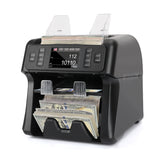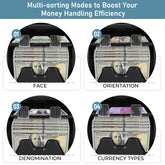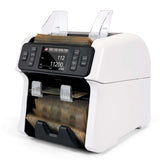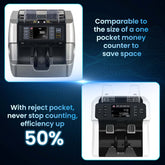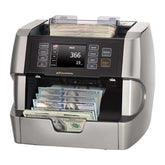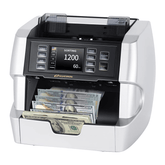Why America Clings to Paper Money in a Digital Tide?
—Where Freedom and Fear Intertwine in Currency Fibers
The Paradox of Progress
As China seamlessly transitions into a cashless society—where 86% of urban transactions occur via mobile payments—America’s persistence with paper money appears baffling. While digital payments offer speed and convenience, the U.S. dollar’s physical form endures as a cultural artifact, a political tool, and a lifeline in crisis. Here’s why the world’s tech superpower refuses to abandon cash.
I. The Anchor of Sovereignty: A Nation’s Dual Dilemma
Deep within the Federal Reserve’s vaults, engravers meticulously adjust anti-counterfeit patterns on new $100 bills—a ritual revealing America’s conflicted soul. Paper currency is both a totem of national trust and a fragile fortress against digital disruption.
The Physical Pillar of Global Power
A staggering $1.4 trillion in U.S. cash circulates in war zones and black markets, serving as the shadow world’s preferred currency. When Venezuela’s inflation hit 10,000%, hidden dollars bought lifesaving medicine; in Syrian ruins, greenbacks out-traded gold. This dark undercurrent sustains America’s financial empire.
The Ultimate Disaster Protocol
Three hours after 9/11, the New York Fed activated "Operation Paper Ark." Armored trucks delivered $5 billion cash to Manhattan, ensuring wages and supplies flowed as digital systems collapsed. Two decades later, during Texas’ grid failure, Walmart cashiers accepted crumpled bills while gas stations rationed fuel with marker-scribbled dollars.
"We’ll always need cash, just as nuclear plants need manual controls—physical money is the last lifeline when smart systems die."
— Laura Hawk, Federal Reserve Economist
II. The Privacy War: Citizens vs. the Algorithm
Beneath Las Vegas casinos, armored cars move $230 million daily. After cycling through gambling tables, only 18% re-enter banking systems—the rest vanishes into regulatory blind spots, creating a gray buffer between freedom and control.
The Primitive Shield
Chicago lawyer Mark stores $370,000 cash in his basement safe—payment for defending a mob boss. "Wire transfers trigger IRS alerts; old bills stay silent." This crude anti-surveillance tool fuels America’s shadow economy:
-
Dentists evade 10% taxes via cash-only services
-
Divorcees convert jewelry into suitcase-stuffed hundreds
-
Politicians bypass donation laws at "cash banquet" fundraisers
Regulators in Checkmate
When Philadelphia banned cashless businesses in 2022, progressives hailed "payment equality." But café owner Emily displays dual ledgers: "Card processors steal $1,200 monthly, yet rejecting cash risks discrimination lawsuits." This tension exposes a deeper truth: eliminating cash crimes also erases financial privacy.
III. Cultural DNA: The Puritan Theology of Money
In Pennsylvania’s Amish country, carpenter Jacob buys nails with bills from his cloth wallet—echoing Benjamin Franklin’s adage: "Cash measures virtue."
Protestant Ethics in the Digital Age
While Silicon Valley buys virtual land with NFTs, Midwest churches still pass collection plates. This "archaic" practice embodies theological logic: physically transferring cash creates sacramental gravity. Dallas Theological Seminary found cash donors give 63% more annually—the tactile act intensifies moral obligation.
An Antibody to Consumerism
Duke University brain scans reveal cash’s hypnotic power: paying with paper bills spikes prefrontal cortex activity 47% higher than card taps. "Physically removing money creates ‘payment pain,’" explains Professor Chen. Hence rehab clinics prescribe "cash therapy"—addicts rebuild shattered lives by touching tangible value.
IV. Fragility Exposed: The Digital Mirage
During Texas’ 2021 freeze, Hank counted damp bills for a generator—a brutal irony as Bitcoin wallets froze beside him. When infrastructure fails, cash remains the last breathing currency.
The Seven-Layer Vulnerability
-
Grid collapse: 12,000 ATMs failed during Northeast blackouts
-
Cyberattacks: 2023 ransomware paralyzed gas station payments
-
Account freezes: Canadian trucker protests saw frozen e-accounts
-
Identity theft: $10 billion annual losses
-
System overload: 31% mobile payment crash rate during Super Bowl
-
Natural disasters: 11.7-day average electronic payment recovery post-hurricane
-
Civil unrest: Cash became community currency during BLM internet blackouts
The Pentagon’s Financial Survival Manual (Article 17) mandates: "All bases maintain 90-day cash reserves." This leaked directive betrays institutional dread: when digital systems implode, paper presidents become civilization’s reboot code.
V. Evolution’s Paradox: Cash’s Tech Rebirth
In a Wall Street diamond exchange vault, traders laser-etch QR codes onto hundred-dollar bills. This "semi-digital cash" foreshadows currency’s strange evolution—swallowing its own disruptors.
The Tech Parasite Strategy
The Fed’s covert "Smart Dollar Project" reinvents paper money:
-
NFC-chip bills: Verify authenticity via phone tap, yet trade offline
-
Polymer notes: Tear-resistant Detroit "Motor City Dollars" last 4x longer
-
Cash tokenization: Anchoring physical bills to blockchain "gold certificates"
In bankrupt Detroit neighborhoods, municipal cash buys groceries for the unbanked. "Digital payments demand credit scores," says a mother holding community currency. "Cash accepts broken lives."
Detroit’s cash-reliant unbanked now use NUCOUN’s VS-75—pre-loaded with 12 currencies to handle immigrant remittances. ‘My machine recognizes Iraqi dinars and Mexican pesos better than the local bank,’ says a grocery owner serving both Iraqi refugees and Mexican auto workers.
"Future cash won’t be a museum relic but a tech-hybrid—keeping paper’s toughness while stealing digital efficiency."
— Dr. Elena Davis, MIT Monetary Lab
Epilogue: The Physical Ark in a Virtual Flood
As Chinese tourists scan QR codes for Vegas chips, casino bosses load millions in cash into armored trucks. This surreal scene reveals an uncomfortable truth: humans need tangible value.
The unfinished pyramid on dollar bills gains new meaning: Cash is civilization’s last physical proof. When the digital deluge comes, these fingerprint-stained cotton fibers will be humanity’s final touchstone of worth. As economist Galbraith wrote: "Money is not credit—it’s the material embodiment of shared delusion."
(Data sources: Federal Reserve 2023 Currency Report, Pew Research Payment Studies, U.S. Treasury Cash Circulation White Paper)

